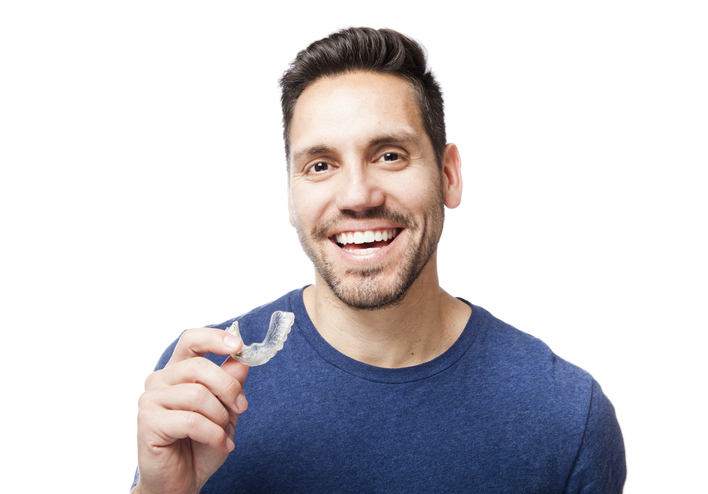-
Teeth Whitening Benefits

Is your smile as white as it could be? If your pearly whites aren’t so pearly and white, you may want to look into teeth whitening. There are a few different options from which to choose, and your dentist can help you determine which one is right for you.
- In-office teeth whitening can produce dramatic results. Even though in-office and home whitening kits each use peroxide-based bleaching agents, the solutions available to the dentist is much stronger than any you’d use at home. That means your teeth will get brighter, faster, and can get up to eight shades lighter in a single 2-hour appointment. The treatments can be a bit pricey, though, and may not be covered by your dental insurance.
- At home, you have several options to brighten your smile. These choices are less expensive than the treatment you’d get at the dentist and more convenient to fit into your schedule.
- Whitening strips and gels are applied directly to the teeth. They’re peroxide-based and typically require reapplication once or twice a day for up to two weeks. Results last about four months.
- Tray-based bleaching systems involve a mouth guard-like tray. This tray is filled with bleaching gel or based, and placed over the teeth for one or more hours each day for up to four weeks. You can buy these over the counter, or your dentist can custom fit it for you.
- Tooth-whitening toothpastes can only brighten your teeth by about one shade. They contain chemicals or polishing agents, and sometimes peroxides, but because they don’t stay on your teeth very long, they don’t work as well as other methods.
- Maintenance is important no matter how you whiten your teeth. Once your teeth are whitened, keep them that way by brushing, flossing, and rinsing daily. It’s also a good idea to avoid acidic and tannin-rich beverages and foods like coffee and tea, wine, sports drinks, sodas, berries, and sauces.
- Whatever you do, talk to your dentist before you make your decision. Some people are not good candidates for teeth whitening. If your teeth are sensitive, it can be very uncomfortable. If your teeth are brown, gray, or purple, you won’t get the same results as someone with yellow teeth. Teeth whitening is not a good idea for those with poor oral health, or for people with crowns, caps, and other restorative work to the front teeth. Your dentist will be able to advise you on how best to improve your smile, no matter what your situation.
At Glenwood Premier Dental, we believe that a healthy, confident smile is an important part of a happy and healthy lifestyle. Our staff of caring professionals is committed to offering a wide range of dental services, exceeding our patients’ expectations, and providing the best possible service. We offer dental exams and teeth cleanings, implant dentistry, Invisalign, laser dentistry, teeth whitening, veneers, and more, using state of the art technology in a comfortable and friendly environment. If you’re looking for dental care in Hazlet, contact us through our website or call 732.264.4477 for more information.
-
Is Invisalign right for Me?

Are you happy with your smile? If you’re like a lot of people, you may be displeased with the way your teeth look, and uncomfortable showing them when you smile. The idea of braces might not appeal to you, because they’re expensive, uncomfortable, and unsightly. But have you ever considered Invisalign? Take a look at these facts about how Invisalign works, to see if it’s right for you.
- Most people can be helped with Invisalign. Even if you think your teeth are too crooked for the process, you’re probably mistaken. Invisalign helps people with overbites, underbites, crossbites, openbites, crowded teeth, and gap teeth. We help with mouths that just need a little tweaking and those that need an overhaul. We can help teenagers who still have some of their baby teeth, and in fact, Invisalign works for children whose permanent teeth have not yet arrived on the scene.
- It all starts with a consultation. The dentist will examine your teeth and create a virtual model of your mouth using a smile scanner. There’s no uncomfortable goop, just a 3D representation of your teeth that your dentist can use to plan a map to a new smile. You’ll even be able to see how it’s all going to work, even before you get started.
- Once a model is made, it’s time to get started. We create aligners with your comfort in mind, custom made and hand trimmed, so that they fit not only your teeth but also your gums. After your aligners are finished and have been checked for quality, you’ll head back to the dentist’s office to pick them up.
- With Invisalign, you’re never alone. That first visit after your aligners are made, you’ll meet with your dentist, who will make sure they fit well. Your dentist will also be able to answer any questions and let you know what to expect. The key to your success with Invisalign is that you and your dentist will work as a team as you make your way to a new smile.
- Invisalign doesn’t interfere with your life. You can keep eating the foods you enjoy, remain active in sports and other activities, and brush and floss the way you normally do. You won’t have the experience of broken wires and brackets, so you’ll have fewer emergency visits than people with traditional braces, and your Invisalign aligners are so unobtrusive, most people may not even notice that you’re wearing them.
- Caring for your aligners is easy. Take them out to eat and drink, and brush your teeth before you put them back in. You’ll wear your aligners 20 to 22 hours each day, and keep each set for one to two weeks. Every six to eight weeks you’ll have a checkup and pick up your new aligners. While each new set of aligners may be slightly uncomfortable at first, the pressure will fade after the first few days. Cleaning your Invisalign aligners is easy: you just rinse them each night and brush them gently with your toothbrush. To keep them clear, use the Invisalign cleaning system.
Are you ready to let Invisalign improve your smile? At Glenwood Premier Dental, we believe that a healthy, confident smile is an important part of a happy and healthy lifestyle. Our staff of caring professionals is committed to offering a wide range of dental services, exceeding our patients’ expectations, and providing the best possible service. We offer Invisalign, as well as dental exams and teeth cleanings, implant dentistry, laser dentistry, teeth whitening, veneers, and more, using state of the art technology in a comfortable and friendly environment. If you’re looking for dental care in Hazlet, contact us through our website or call 732.264.4477 for more information.
-
Preparing for Your First Dental Appointment

If you’re like most parents, you’re eagerly documenting and enthusiastically enjoying each new milestone. From baby’s first smile to baby’s first steps, each new phase is a cause for celebration as your little one grows into a child. So here’s a question: have you given any thought to baby’s first dental appointment? Experts say it should be scheduled sometime between the first tooth and the first birthday.
Why does it need to be so early? Where there are teeth there is the possibility of cavities. When you are proactive about your child’s dental health, you lay the foundation for a lifetime of healthy teeth. What’s more, when you properly prepare for your little one’s first dental appointment, you can help allay any fears and make the trip a happy one.
- Introducing oral care early can lay the groundwork for a successful trip to the dentist. As soon as your baby’s first tooth erupts, clean the gums with a soft, damp cloth. Making a child comfortable with someone cleaning his or her mouth can make it less daunting when the dentist does it. Depending on the age of the child when you make that first appointment, you might practice by having the child open his or her mouth and let you count the teeth.
- Set your child up for success. Schedule the appointment at the right time of day, early enough for the child to feel fresh and energetic, and not at any time that would interfere with a nap or meal, which could lead to crankiness. Prepare your little one by talking about what’s going to happen, and perhaps reading books or watching videos about going to the dentist.
- Make sure you’re well-prepared, too. Ask if you can fill out patient forms ahead of time, and make a list of questions to ask the dentist, so you don’t forget. Make sure that you keep any fears or anxieties that you may have about dental exams under control, to avoid passing these worries along to your child.
- Know what to expect once you’re at the dentist. The dentist will examine your child’s mouth to make sure the teeth and jaw are developing normally, and there are no mouth injuries, cavities, or other issues. If your child can’t or would rather not sit in the chair alone, you’ll be permitted to hold him or her on your lap. The dentist will offer information on gum and tooth care, answer your questions about things like nutrition and pacifiers, and demonstrate appropriate brushing techniques.
- Keep up with your child’s dental hygiene. After that first visit, your child should see the dentist at least once every six months. Talk to your dentist about your unique child; some children may need to be seen more often. At home, keep cleaning those teeth and gums with a cloth, switching to a small, soft toothbrush as more teeth come in, and adding a pea-sized amount of toothpaste around two years of age, when the child is old enough to spit the toothpaste out instead of swallowing it. Teach your child to properly brush his or her own teeth, helping with the process until the child is about six years of age.
- Instill good eating and drinking habits for healthy teeth. Steer clear of foods that can contribute to tooth decay, like sticky candy, fruit leather, and sweet drinks. Offer fruit rather than juice, because fruit has healthy fiber that helps clean teeth, but juice merely exposes the teeth to sugar. Don’t put your child down to sleep with a bottle of milk, juice or sweetened liquid, and limit the time your child spends with a bottle to five or six minutes.
When you help a child develop healthy habits, and introduce the dentist’s office as a happy place full of people who want to help, you’re setting that child up for a lifetime of good dental health. At Glenwood Premier Dental, we believe that a healthy, confident smile is an important part of a happy and healthy lifestyle. We care for patients of all ages here, and if you have any questions about your baby’s oral health, one of our dentists in Hazlet will be happy to assist you. When you’re looking for dental care in Hazlet, contact us through our website or call 732.264.4477 for more information.
-
How to Overcome Halitosis

Few things are more embarrassing than having bad breath, and yet if you struggle with halitosis, you’re not alone. About 25-30 percent of the world’s population suffers from chronic halitosis, from a variety of causes. It can be the result of a medical condition like diabetes, sinusitis, or intestinal disorders, or it could happen because of malnutrition or dry mouth, but most of the time the problem originates with the gums, teeth, and tongue. What can you do about it? It all begins with better habits.
- Clean your teeth more thoroughly. Spend two to three minutes at least twice a day, brushing each tooth to remove plaque, the sticky buildup on your teeth that collects bacteria and causes bad breath. It’s extremely important that you brush your teeth before going to bed, and you might consider a second round of tooth brushing with baking soda, to reduce your mouth’s acidity. Floss at least once a day, to get the food debris your toothbrush can’t reach. Have dentures? Remove them each night and clean them to remove bacterial buildup.
- Don’t forget your tongue. The coating on your tongue can harbor smelly bacteria, but brushing your tongue when you brush your teeth can get rid of it. If brushing your tongue with your toothbrush is uncomfortable, try a tongue scraper. These tools, available at your local drug store, are specifically designed for cleaning the surface of the tongue, removing bacteria, dead cells, and food debris.
- Give it all a rinse. Using a mouthwash designed to kill bacteria and not just mask odors can help solve your problem. Swishing with plain water after you eat can also help your breath by removing food particles from your mouth, and research indicates that if you rinse your mouth with black or green tea you’ll suppress the growth of halitosis-causing bacteria.
- Keep your body hydrated and your mouth moist. Drinking at least six to eight 8-ounce glasses of water each day can help you avoid dry mouth, and chewing sugarless gum or sucking on sugarless candy can stimulate the flow of saliva.
- Eat the right kinds of food. If you’re going to be around people, don’t eat foods like onion and garlic that can sour your breath. Do snack on crispy fresh fruits and vegetables, which can boost your saliva flow and help clean your teeth. You can also chew on cloves, fennel seeds or aniseeds, fresh parsley, basil, mint, or cilantro, or even a piece of orange or lemon rind. All of these things can help freshen your breath by discouraging the growth of bacteria, neutralizing odors, and stimulating saliva production.
- Don’t smoke. Smoking makes your breath smell bad, but it also damages your gums, which can make your breath even worse. Protect yourself from gum disease and oral cancers by avoiding tobacco entirely.
- Be mindful of your gums. If you’ve got unhealthy gums, bacteria can accumulate in pockets at the base of your teeth, leading to bad breath. Gently brush around the gum line when you brush your teeth, to help your gums stay healthy, but see a dentist regularly to make sure to keep them that way.
- Your dentist can help keep your breath good and your teeth healthy. Visit your dentist regularly, and make sure to address any concerns you might have about your breath. Your dentist will be able to rule out any dental problems and help you find the solution to your problem, and can refer you to your medical doctor if the issue appears to be systemic.
At Glenwood Premier Dental, we believe that a healthy, confident smile is an important part of a happy and healthy lifestyle. Our staff of caring professionals is committed to offering a wide range of dental services, exceeding our patients’ expectations, and providing the best possible service. We offer dental exams and teeth cleanings, implant dentistry, Invisalign, laser dentistry, teeth whitening, veneers, and more, using state of the art technology in a comfortable and friendly environment. If you’re looking for dental care in Hazlet, contact us through our website or call 732.264.4477 for more information.
